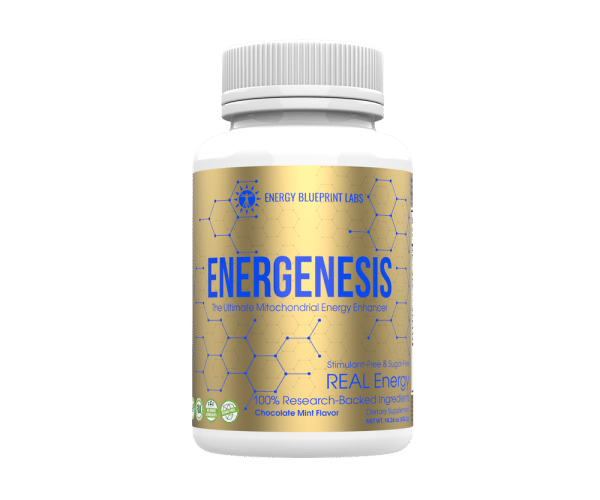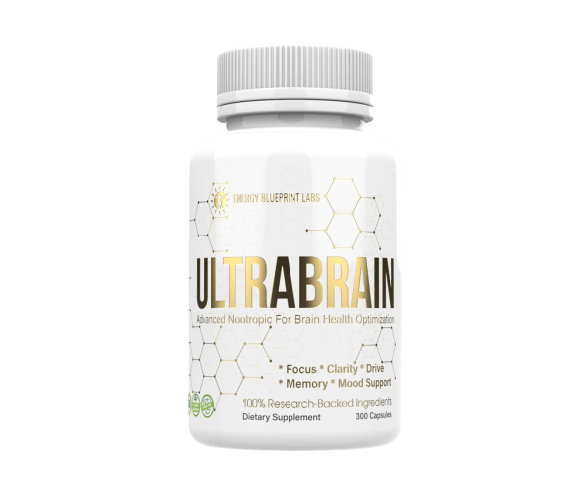Consider this little thought experiment: what do you think would happen if a delivery of wood never made it to a chair factory that turns wood into chairs? The factory was running at full capacity, all of the machines were operating perfectly, and every worker that needed to be there was present — the wood just never showed up.
Nothing would be made, right?
You can’t make wooden chairs out of nothing, and if there was never a delivery of wood, then it doesn’t matter how efficient the factory was, it may as well shut down for the day.
Now pretend this factory was your mitochondria — they don’t make energy out of nothing, and our body uses intricate transport systems to get raw materials inside of them to be used for energy production. One of those transport systems is called the carnitine shuttle system, which is essential for bringing fatty acids inside mitochondria.
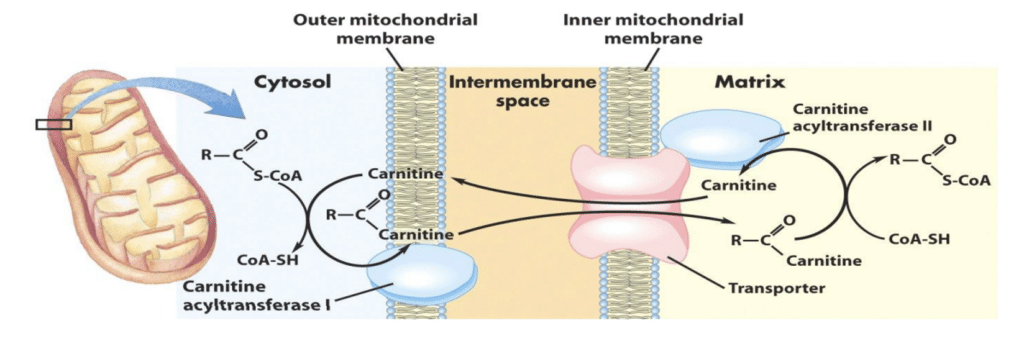
Mitochondria Need Carnitine to Produce Energy
If you don’t have enough carnitine, you won’t be burning fat and your mitochondria are going to have one hell of a time making energy. Even if everything else about them is functioning optimally, a lack of carnitine will cause your mitochondria to act as if they are damaged and dysfunctional.
At the extreme end of this situation, where there is a genetic deficit in carnitine biosynthesis, some nasty stuff happens without carnitine supplementation [1]:
- Liver damage and dysfunction
- Brain damage
- Muscle weakness
- Lethargy
- Exercise intolerance
Yet, there can also be situations of mild deficiency where these overt signs aren’t present. A systematic review of 25 studies investigating the relationship between mitochondrial function and fatigue reported that carnitine deficiencies were one of the most common biomarkers linked to fatigue status [2].
In other words, if you’re chronically fatigued and struggling with your daily energy levels, it is a good bet that you could have problems with your carnitine system.
We also see problems in the carnitine system with metabolic dysfunction — carnitine levels are reduced in rats that develop insulin resistance regardless of whether the insulin resistance is brought about from diet-induced obesity, genetic alterations, or simple aging [3]. Yet, carnitine supplementation greatly offsets the metabolic perturbations and restores mitochondrial function.

In humans, meta-analyses of intervention studies using carnitine have documented reductions in body weight and fat mass in overweight and obese adults [4], as well as markers of systemic inflammation, including C-reactive protein (CRP), tumor necrosis factor alpha (TNF-ɑ), and interleukin-6 (IL-6) [5,6].
In other words, if you’re struggling with your waistline or metabolic health, then you could have problems with your carnitine system.
Or maybe you’re healthy, but you’re aging. Carnitine levels and the ability to synthesize carnitine decline as we age [7], which may help explain why energy levels tend to dip and metabolic health tends to decline as we get older, even if all else remains pretty stable.
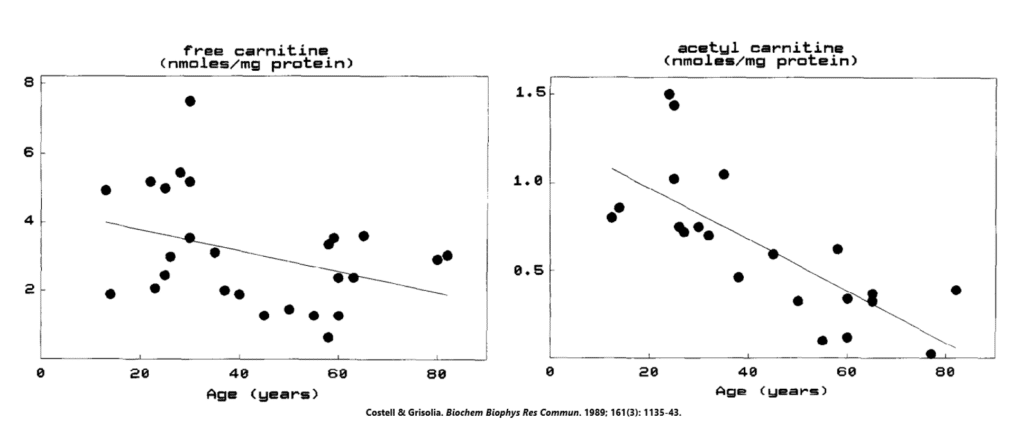
Thankfully, the solution is pretty simple: supplement carnitine. If you’re getting older, trying to improve your metabolic health, or battling fatigue, carnitine supplementation may help. And if you’re going to do that, then you might as well optimize the form you take.
ALCAR Rejuvenates Mitochondria
Acetyl-L-Carnitine (ALCAR) is a special form of carnitine that hits two birds with one stone — it supplies the carnitine your mitochondria need to produce energy, and it provides an acetyl moiety that the mitochondria use to remain youthful and healthy.
Over 20% of mitochondrial proteins are reliant on these acetyl moieties to function properly, including those involved in antioxidant defenses and energy production [8]. In fact, one of the key changes in physiology associated with longevity is an increased acetylation of mitochondrial proteins [9].
When you supplement with ALCAR, it enters into mitochondria and binds with a molecule called coenzyme A, producing free carnitine plus acetyl-CoA. The carnitine is free to start shuttling fat into the mitochondria to be used for energy production, while the acetyl-CoA molecule is free to start acetylating mitochondrial proteins that require modifications to remain healthy and functional [10].
For these reasons, some researchers have proposed that ALCAR should be considered a “mitochondrial rejuvenator” [11]. By virtue of increasing acetyl-CoA levels within mitochondria, ALCAR effectively increases antioxidant status, increases protein and membrane stability, enhances biogenesis, and reduces cell death.
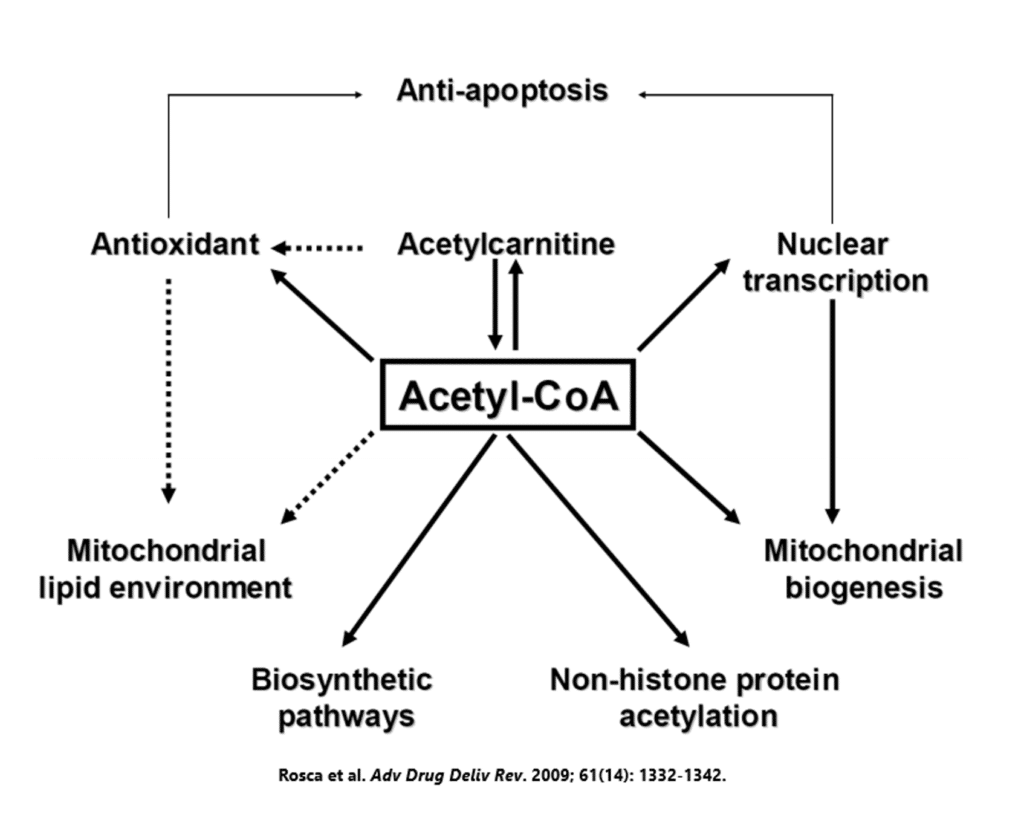
ALCAR Benefits Brain Health
At this point, what should be clear is that ALCAR has two profound benefits for mitochondrial function: (1) it provides the carnitine necessary for fatty acids to enter mitochondria and be used in energy production, and (2) it increases mitochondrial acetylation.
One of the best areas of research where these two benefits collide is in brain health, particularly neurodegeneration and dementia. In patients with Alzheimer’s disease, research has found lower activity of the carnitine shuttle [12], lower activity of the enzymes responsible for creating acetyl-L-carnitine [13], and lower levels of acetyl carnitines [14].
In fact, ALCAR concentrations slowly decline as cognitive impairment progresses, being 22% lower than normal in those with subjective memory complaints, 28% lower in those with mild cognitive impairment, and 36% lower in Alzheimer’s patients [14].
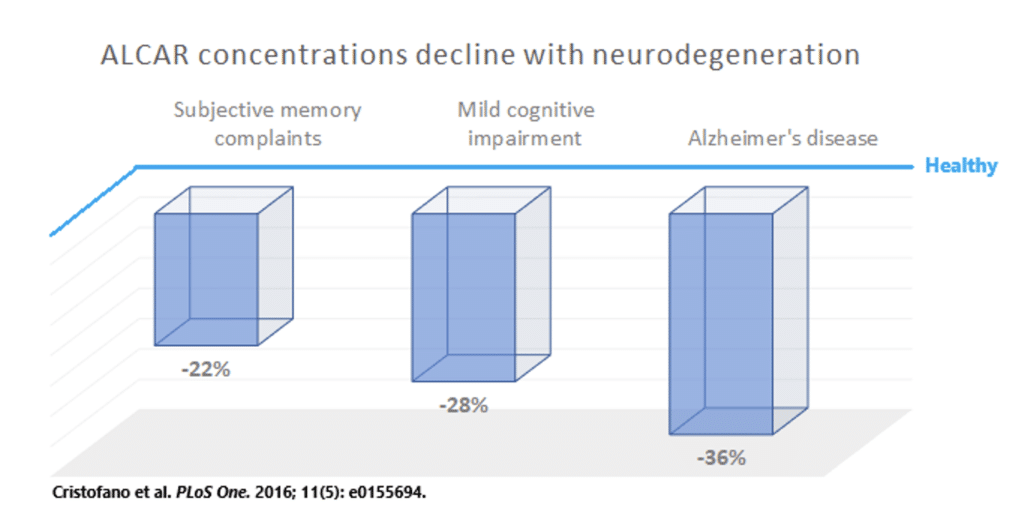
Through increasing mitochondrial acetylation and carnitine levels within the brain, ALCAR supplementation affects several parameters of brain health that we could expect to help fight neurodegeneration and dementia:
- Improves mitochondrial function within brain cells [15,16].
- Increases acetylcholine signaling and improves learning capacity [17,18].
- Increases brain energy availability [19].
- Protects against β-amyloid neurotoxicity and reduces oxidative stress [20].
And no, regular carnitine cannot accomplish these same things. In a head-to-head comparison trial pitting ALCAR against carnitine, only ALCAR reduced several biomarkers of oxidative stress within the brain, including those for lipid peroxidation, DNA oxidation, and protein oxidation [21].
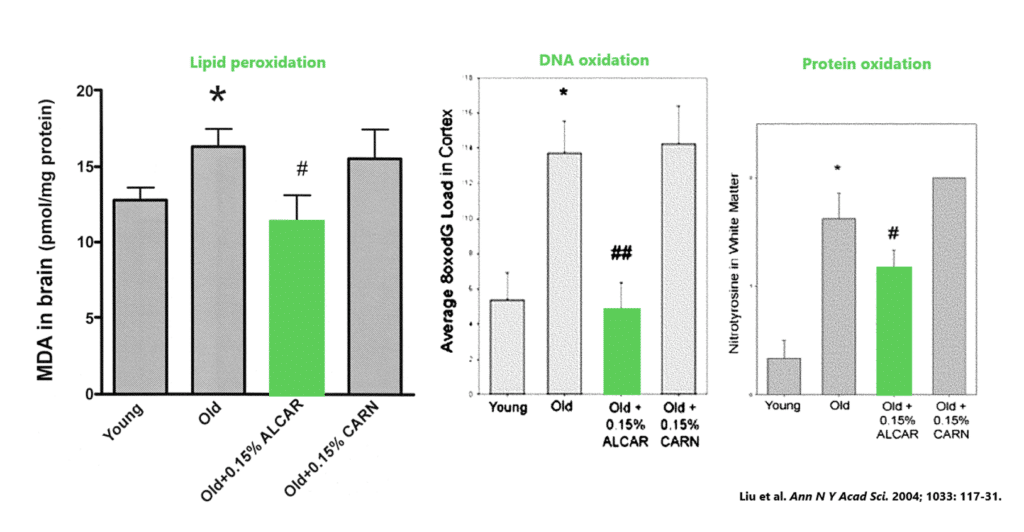
Both were able to similarly increase total-body and brain-specific concentrations of carnitine, so we know that this didn’t play a role in reducing oxidative stress. Rather, ALCAR’s ability to increase mitochondrial acetylation was likely the reason behind its benefits.
Ultimately, these mechanistic benefits play out in clinical trials, where ALCAR supplementation has been shown to improve cognitive function and slow neurodegeneration [22].
For example, a meta-analysis of 21 randomized, double-blind, placebo-controlled trials reported that 1.5–3 g/d of ALCAR significantly improved cognitive function assessed by a variety of methods in older adults with mild cognitive impairment or early Alzheimer’s disease [23].
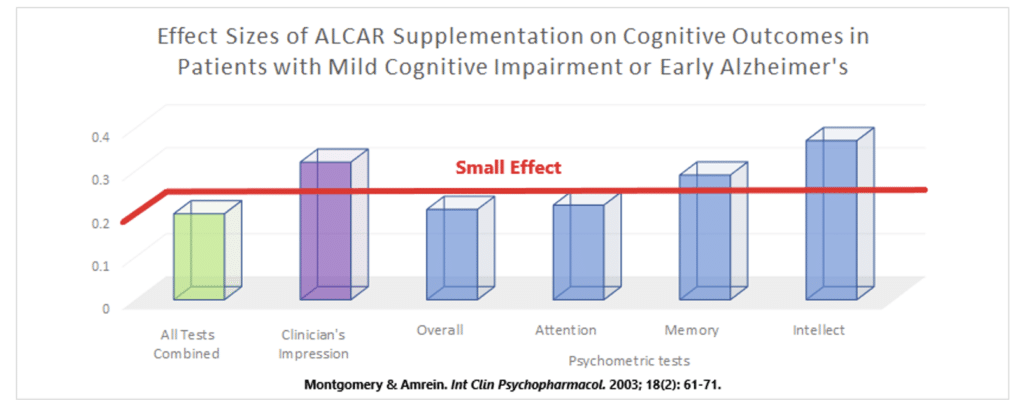
The effects weren’t huge, but they were comparable to current Alzheimer drug therapies [24]. Moreover, the benefits were seen as early as 3 months after starting supplementation and grew with time.
Other studies have documented cognitive improvements from ALCAR supplementation in those with vascular dementia [25], those who recently suffered a stroke [26], and those with hepatic encephalopathy [27,28].
Lastly, to bring things back to mitochondria and energy levels, 4 g/d of ALCAR has been shown to improve cognitive function, reduce mental and physical fatigue, and improve the ability to function in daily life compared to a placebo in elderly adults complaining of excessive fatigue [29].
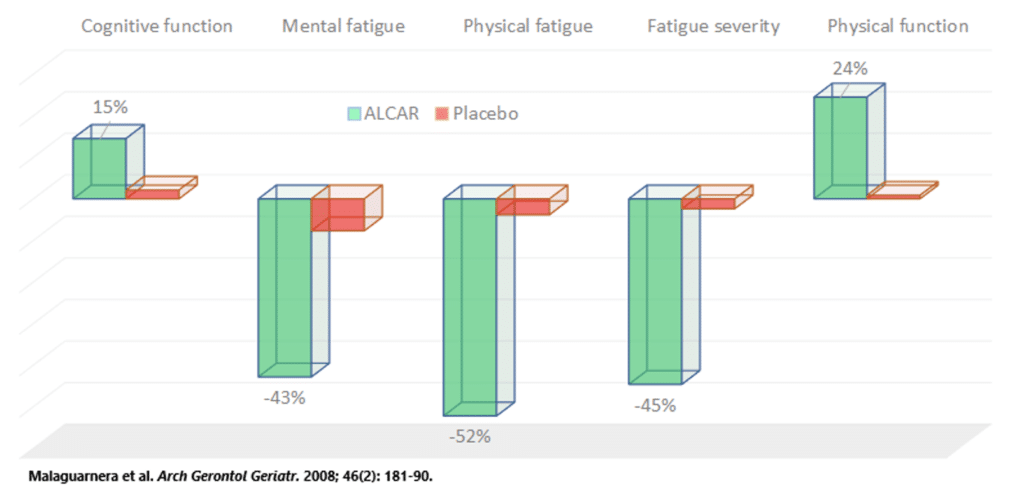
Summary
Your mitochondria require carnitine to get fatty acids into their energy-producing factory. If you don’t have enough carnitine, you won’t be burning as much fat, and you won’t be making as much energy. The result is weight gain, metabolic dysfunction, and chronic fatigue.
Your mitochondria also require regular upkeep through acetylation of their protein structures that let their little factories run at maximal capacity. Acetyl-L-carnitine (ALCAR) is a supplement that gives you the best of both worlds: it provides carnitine and acetyl moieties that the mitochondria can use to remain healthy and functional.
The benefits of ALCAR are best-shown in its ability to protect the brain from oxidative stress and neurodegeneration, effects not seen with regular types of carnitine.
Overall, the science overwhelmingly shows that ALCAR is a powerful mitochondrial rejuvenator and brain-enhancing supplement. That is why we’ve made it one of the cornerstone ingredients in both our mitochondrial energy formula, Energenesis, and our brain health formula, UltraBrain.





